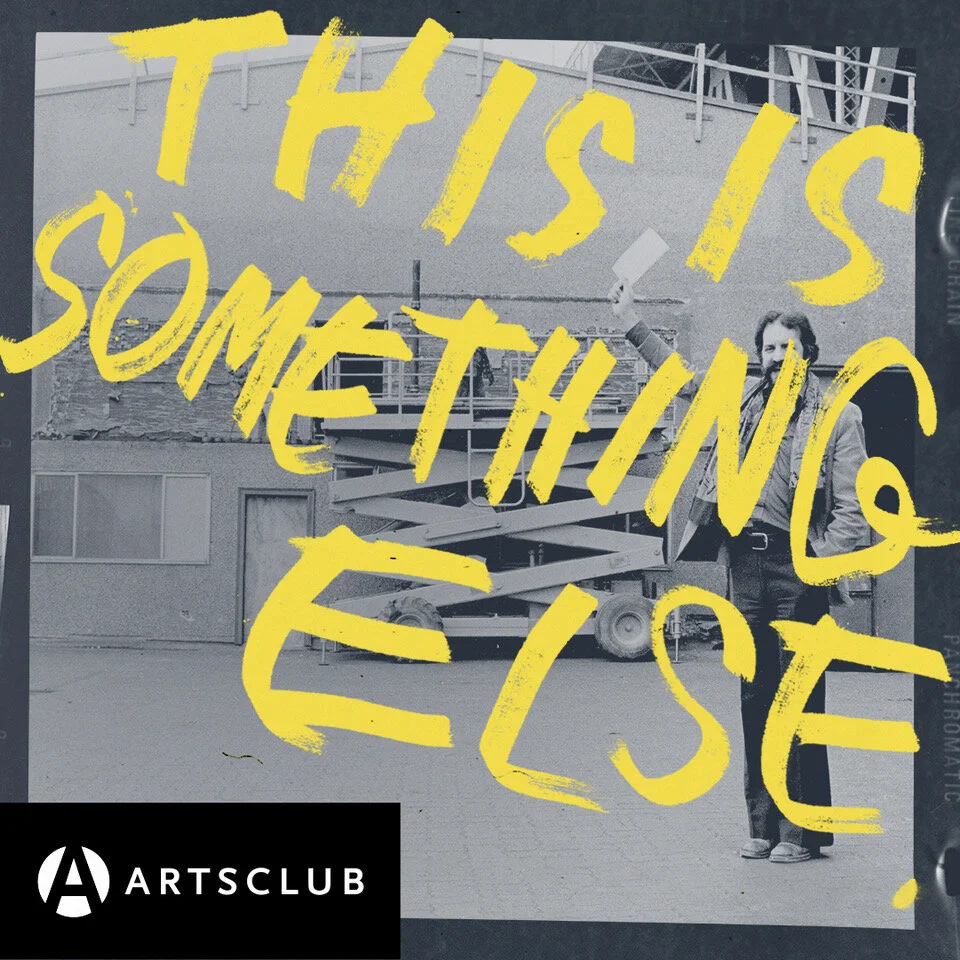This Is Something Else podcast digs into Arts Club and local-theatre history through conversation
Andrew Kushnir’s five-part series mines a half-century of stories behind building a company—and a Vancouver stage voice
Andrew Kushnir. Photo by Hamish Birt
A lineup outside the late, great Seymour Street Stage.
The Arts Club Theatre presents the first episode of This Is Something Else starting April 7. Further episodes will arrive weekly. The podcast can also be heard on Spotify, Apple Podcasts, and other platforms where podcasts are available.
MIDWAY THROUGH 72 hours of conversations for his far-reaching new podcast about the half-century history of the Arts Club Theatre, Andrew Kushnir had a revelation.
The Toronto-based theatre artist says he went into the five-part This Is Something Else with a rough thesis: that a unique Vancouver stage scene evolved here because it was a “city cut off by the mountains”. (He now humbly admits this may have been a result of an “Eastern mindset”.)
But gathering anecdotes about the theatre company and the larger arts ecology here, he came to a realization that it wasn’t the isolated hothouse he had thought. Vancouver theatre people, and their creations, have solid links across the country.
“It was very moving to understand the Arts Club is a national story,” the energized and affable theatre artist tells Stir over a call from directing rehearsals in Montreal. “To realize Brent Carver goes on to take on the monumental theatre world, or Anne Mortifee...These were all artists who cut their teeth in the Seymour Street Theatre—this small attic space that used to be a garage in an old gospel hall. So it really landed on me that Vancouver is deeply connected to everyone else.”
The Seymour stage, of course, was the late, great old building at Seymour and Davie streets that a group of impassioned artists, musicians, and actors officially converted into the Arts Club Theatre in 1964. The 250-seat venue helped launch the careers of the likes of not just Carver and Mortifee, but stars who would go on to Hollywood, Stratford, and Broadway; names like Bruce Greenwood, Michael J. Fox, and Janet Wright. The company would later add the Granville Island Stage in 1979, the smaller Revue Stage next door in 1983, and the Stanley Industrial Stage in 1998, with the new Goldcorp Stage opening in November 2015. In all, it would become the largest urban theatre company in Canada.
But as of November 19, of course, all the Arts Club stages are dark, thanks to public-health orders that shut down live-performance venues due to the pandemic. And that enforced pause has sent a lot of artists and arts companies into a state of reflection. Looking for ways to recall the Arts Club’s own legacy, its artistic director Ashlie Corcoran and her team approached Kushnir about creating a podcast that would take a deep dive into the company’s colourful history.
The artist was well placed for the commission. He had acted at the Arts Club as well as worked on various documentary stage pieces (think The Middle Place and his Khari Wendell McClelland collab Freedom Singer), including his own company Project: Humanity’s verbatim-theatre works (built from real people’s words). He also had a big hand in the massive The Gay Heritage Project that came to the Cultch in 2016.
Still, for his first podcast, Kushnir knew that he didn’t want to try to repeat what other local theatre historians have done. He set out to create something closer to the podcast This American Life than Vancouver Theatre History 101. And so the aptly titled This Is Something Else: Consciously Eclectic Histories of the Arts Club was born over several months.
Kushnir says he likes to think of history not as a noun, but as a verb—a living practice. “When we remember our history, it’s an event in the now, and a way of looking forward, frankly,” he says. “I said, ‘What can I do that’s different?’And what I can do is talk to people and really invest in oral storytelling.
“That makes it very subjective,” he emphasizes. “There’s a multiplicity of voices and multiplicity of perspectives, so it’s finding as many angles as possible about something.”
Having worked at the Arts Club, but also elsewhere in the country, he says he has the perspective of someone both “inside and outside” the scene here. “That straddling affords certain kinds of curiosity and ignorance,” Kushnir explains.
And so Kushnir plunged into interviews, speaking to 43 artists, historians, patrons, and others—including longtime artistic director Bill Millerd, playwrights Morris Panych and Anosh Irani, director Kim Collier, actor Omari Newton, and dozens of other surprise guests.
Kushnir was particularly stunned by the forces in 1960s and 1970s Vancouver who brought the Arts Club into being.
“Some of the thinking in the ’60s is so radical and inspiring!” he comments. “I was so stunned by the ingenuity. They were met with so many ‘No’s and they said ‘Well, we’re gonna do this anyway!’”
Kushnir adds that looking to these dedicated pioneers is highly instructive as we search for a way forward in these uncertain times—when rebuilding what’s been lost with venue closures sometimes seems impossible. “It’s good to look back and see a bunch of radical thinkers say, ‘We’re gonna do this no matter what,’” Kushnir says.
From that infancy, Arts Club artists began, in the late ‘70s, to find an original Vancouver voice, he adds. That voice would come to flourish two decades later, with indelible national hits like The Overcoat, Tear the Curtain!, and Onegin—shows that cross genres, blending movement and music with theatre.
“We talk about the way the dance scene in Vancouver has moved into the storytelling of theatre,” he says of the podcast. “There’s also this scale in terms of storytelling.”
Another key moment in the five-part series comes through the 1980s and ‘90s, once the Seymour stage has been lost to the wrecking ball, and the Arts Club seeks to expand beyond Granville Island to save and refurbish the grand heritage landmark that is the Stanley Theatre. Kushnir dovetails that narrative into that of an organization with the opposite trajectory: the once equally celebrated Playhouse Theatre Company, which sadly shut down for good in 2012 after 49 years, its board at the time blaming nearly $900,000 in debt.
“There was this sense of real growth [at the Arts Club] alongside the Playhouse demise,” observes Kushnir, who gathers multiple, often opposing, views on the subject. “The history of the Vancouver Playhouse is equally strong, but it really couldn't stand the forces of real estate.”
Looking at what helped the Arts Club survive changing times may help to chart a way forward through the pandemic crisis, Kushnir offers. This is as important for the theatre that’s the subject of the podcast as much as it is for the larger local and national scene. The Arts Club was one of the venues forced to shut down live shows mid-run in November, after running productions with strict protocols safely for two months in the fall. Because of the number of venues it oversees, there are heavy financial demands for upkeep, even while closed.
After many hours of conversations hosting the new podcast, Kushnir remains optimistic about the ability to pull through.
“I certainly spoke to people wiser than me about how we can sustain ourselves in this moment of uncertainty, and maybe even make ourselves stronger coming out of it,” he says. “In so many efforts to move theatre into a virtual space, the thing I love most is artists are still in motion—and I hope the podcast is an example of that. So that when the recovery begins, we’ll still be in motion. Eventually artists will be the essential workers: they are the ones reconditioning us, and reacquainting us with being with strangers again.
“To keep underlining our importance as artists and the value and function of the arts: that’s what I would see as a secret hope with this.”
















